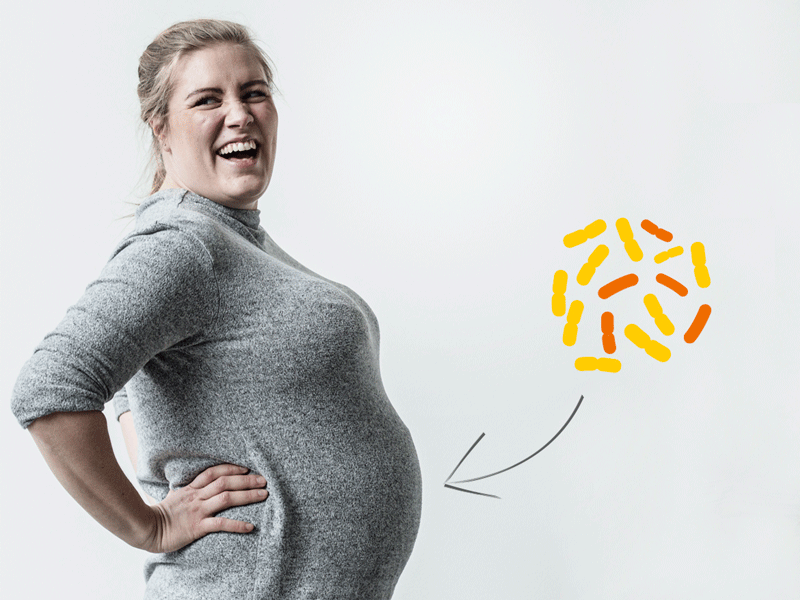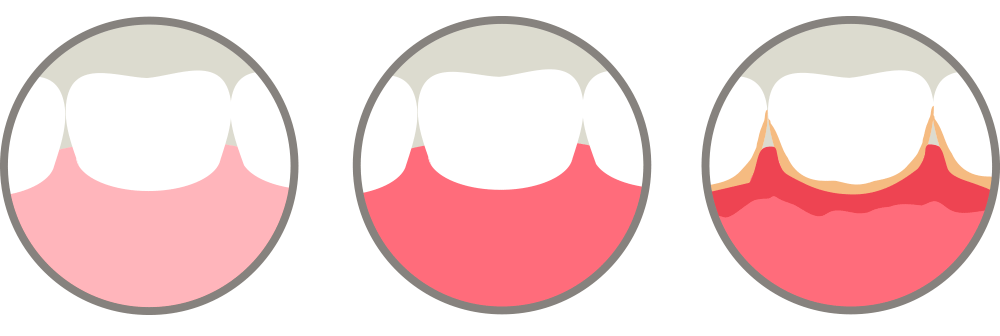Mother and child health
Being pregnant is both a wonderful experience and a major adjustment for your body. No longer are you alone in your decision-making – you must also consider how your decisions will affect your tiny baby’s wellbeing. In many ways, your days as a mother have already begun as soon as become pregnant. Clinical trials have shown that good bacteria may improve gastrointestinal balance, protect against infections, and is safe for both mother and baby.
What are probiotics?Constipation during pregnancy
Feeling bloated and constipated while pregnant? Don’t worry; you’re not alone. In fact, as many as 50% of women suffer from constipation at some point during pregnancy. Constipation during pregnancy is unpleasant and can lead to haemorrhoids. Try to improve your bowel movements by eating more fibre, drinking lots of water and exercising. Studies have also shown that Limosilactobacillus reuteri (formerly known as Lactobacillus reuteri) positively affects gut motility.

Protecting yourself from infections
Staying healthy with a strong immune system is always important but becomes even more so during pregnancy. Although pregnant women aren’t, in general, more susceptible to initial infections, the physiological changes of pregnancy, such as decreased lung capacity, urinary stasis, changes in blood flow, and hormonal shifts, may make infections more severe than they normally would be. Our modern lifestyle, with too little exercise, unhealthy food and high levels of stress, can further increase the risk of getting sick. Since 80% of the immune system is located in the gut, taking proper care of your gut is crucial.
The importance of gut bacteriaSide effects associated with antibiotics
As severe infections can threaten the health of both mother and child, women affected by infections are often prescribed antibiotics. Although antibiotics can be helpful for ongoing infections, unfortunately, they are equally efficient at killing healthy and helpful bacteria. This can cause adverse effects such as nausea, vomiting and skin rash.
Enhance your oral health
During pregnancy, your body’s blood volume increases and your hormonal balance changes. You also have a lower resistance to bad bacteria and, as a result, are more likely to develop mouth infections. Inflammation of the gums, known as gingivitis, is a condition that affects many pregnant women. The most common symptoms are red, swollen and bleeding gums, making both teeth and gums overly sensitive.

As a complement to daily oral hygiene and regular dental visits, supplements of natural lactic acid bacteria can improve your oral health and prevent inflammation. Lozenges and drops containing lactic acid bacteria have been shown to promote healthy oral microbiota in pregnant women.
Read more about oral health and inflammation of the gumsPromoting good bacteria after a C-section
When babies are delivered through the birth canal, they acquire a microbial community that resembles that of their mother’s vagina. During a vaginal delivery, the baby is colonised by maternal vaginal and faecal bacteria. However, babies born via a caesarean section are, instead, colonised by bacteria associated with the skin and the hospital environment. As such, the establishment of healthy bacteria is delayed.
The altered microbiota colonisation in babies born by C-section has been linked to allergies, asthma, type I diabetes, celiac disease, and obesity. However, new evidence suggests that probiotic bacteria could prevent early microbiota dysbiosis induced by C-section delivery, making their microbiota more similar to that of vaginally born babies.
Read more
What is colic?
The most common diagnostic criteria for colic is if the child is under the age of five months and has recurrent and prolonged periods of crying, fussing, or irritability that occur without...
Read more
Our probiotic drops
BioGaia’s probiotic products with L. reuteri are among the most scientifically well-documented probiotics in the world with regard to both efficacy and safety.
Read more
Diarrhea in children
Diarrhea is a very common problem in children younger than age five. The definition of diarrhea is three or more loose or liquid stools per day.
Read more
